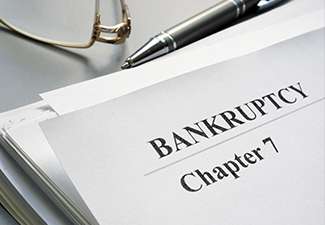Which Chapter of Bankruptcy Should I File?
April 14, 2022
 With economic disruptions caused by the pandemic, many people may have suffered job losses or run up their credit cards to deal with the economic challenges, and now they’re facing an unmanageable debt load. Or an unexpected illness such as Covid-19 might have run up medical expenses sky high.
With economic disruptions caused by the pandemic, many people may have suffered job losses or run up their credit cards to deal with the economic challenges, and now they’re facing an unmanageable debt load. Or an unexpected illness such as Covid-19 might have run up medical expenses sky high.
Is bankruptcy the answer?
To many people, the mere mention of the “B” word runs shivers down their spine, figuring it means not only embarrassment but also the loss of everything they’ve worked hard for. However, bankruptcy exemptions in Texas are among the most generous in the nation, and bankruptcy rarely means losing everything. It often means retaining almost everything while getting rid of unsecured debt loads that you can no longer handle.
If an unmanageable debt is hounding you in Amarillo, Texas, contact me immediately at the Swindell Law Firm. I have four decades-plus experience in helping people resolve their debt issues, and I can help you navigate the bankruptcy system to get the fresh start you deserve.
I proudly serve clients in the Texas Panhandle, including Borger, Pampa, Hereford, and Dumas.
Chapter 7 Bankruptcy
Chapter 7 of the bankruptcy code is probably the one that most people associate with “loss of everything” since it is based on the liquidation of non-exempt assets to pay off creditors. However, it is also the most popular option among filers since it is over quickly and the filers are then discharged from most if not all of their unsecured debts.
But what about their homes and cars? Fortunately, Texas allows extremely generous exemptions for personal assets. You can exempt any amount of equity in your primary residence. The only restrictions are by lot size. Your property must be ten acres or smaller if you’re located in a city, town, or village. The threshold is 100 acres in the country, which can be doubled to 200 acres if you’re filing as a family.
You can exempt equity in all vehicles that are licensed to different family members. You also get a $50,000 personal property exemption, which doubles to $100,000 for a family. You can include almost anything under this generic exemption.
In addition, in any chapter of bankruptcy, you get to retain your qualified retirement accounts, pensions, Social Security, college savings plans, and any court-ordered awards as a victim of a crime. However, most student loans, taxes, and child and spousal support agreements cannot be discharged.
Chapter 13 Bankruptcy
With a Chapter 13 filing, you can retain all your property so long as you are current on your payments and then agree to a three- to five-year repayment plan to use your disposable income to satisfy creditors. To qualify for Chapter 13, you must have a regular income and pass a means test. The means test involves computing your debt load and your income left after basic living expenses.
Creditors receive the same amount whether you file for Chapter 7 or Chapter 13. Chapter 13, of course, takes much longer before you’re discharged from your unsecured debts. Home and car loans must continue to be paid, or the lender can foreclose or repossess their secured assets.
Chapter 13, however, is not available for businesses unless they are sole proprietorships and the debts are all in the name of the sole proprietor.
Chapter 11 Bankruptcy
Chapter 11 is similar to Chapter 13, but it is for businesses and those individuals whose debts are too high for Chapter 13. If your unsecured debts are above $419,275 and/or your secured debts are above $1,257,850, you cannot generally use Chapter 13, but you can turn to Chapter 11.
Chapter 11 is, like Chapter 13, based on a repayment plan, but while in Chapter 13, a bankruptcy trustee will be appointed to oversee your repayment and handle creditors, in Chapter 11 you become what is called a “debtor in possession,” and you will have to deal directly with creditors yourself. This includes getting your creditors to sign off on your repayment plan. If they don’t agree, they can force you into Chapter 7.
How the Swindell Law Firm Can Help
Which chapter of the bankruptcy best fits your situation depends a lot on your debts, your assets, and your income. Chapter 7 is over with the quickest, but your income must be below the median state level for your household size. As of 2021, the median income for a single filer was $52,308 and $88,109 for a family of four.
Bankruptcy filings also require loads of paperwork and computations for a repayment plan for Chapters 11 and 13. These are not do-it-yourself projects. You need the help of an experienced bankruptcy attorney.
If you’re in Amarillo, Texas, contact me at the Swindell Law Firm. I will help you choose and qualify for the proper option and then help you navigate the bankruptcy system to obtain the fresh start you deserve. I proudly serve clients also in the entire Texas panhandle, including Borger, Pampa, Hereford, and Dumas.
